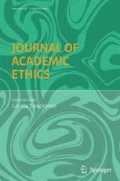Abstract
Recently academic freedom and academic tenure have been in the media spotlight because of concerns that academic freedom is being misused and that academic tenure provides job security to a select few. First, this paper provides a brief history of these two institutions and follow with an analysis using Stone’s (2002) policy analysis format. Second, this paper examines the university through two lenses: (a) an economic market lens; and (b) a community lens. These two lenses offer contrasting views of the university and help explain the different views of academic freedom and tenure. The authors suggest that faculty make use of the economic model to increase their chances of maintaining tenure in a university atmosphere frequently characterized by a business approach rather than a collegial one. Recommendations for future research are also provided.
Similar content being viewed by others
References
Academic Bill of Rights SR 66. (2003). Georgia General Assembly, 2003–4 Sess., 04 LC 33 0427S (SCS) Cong. Rec.
Allen, H. L. (1997). Tenure: Why faculty, and the nation, need it. Thought & Action: The NEA Higher Education Journal, Fall, 95–110.
American Association of University Professors (1940). 1940 Statement of principles on academic freedom and tenure. Retrieved July 22, 2005, from http://www.aaup.org/statements/Redbook/1940stat.htm.
American Association of University Professors (1987). Statement on professional ethics. Retrieved July 31, 2005, from http://www.aaup.org/statements/Redbook/Rbethics.htm.
American Association of University Professors (2003). Academic Bill of Rights. Retrieved July 11, 2005, from http://www.aaup.org/statements/SpchState/Statements/billofrights.htm.
American Association of University Professors (2004). About AAUP. Retrieved July 22, 2005, from http://www.aaup.org/aboutaaup/hist.HTM (September).
Brown, R. S., & Kurland, J. E. (1990). Academic tenure and academic freedom. Law and Contemporary Problems, 53(3), 325–356.
Bullough, R. V. J. (2000). The sounds of silence: Life in the postmodern university. The Education Forum, 64, 324–331.
Chait, R. (1997). Thawing the cold war over tenure: Why academe needs more employment options [Electronic Version]. The Chronicle of Higher Education. Retrieved July 14, 2005, from http://chronicle.com./prm/che-data/articles.dir/art-43.dir/issue-22.dir/22b00401.htm.
Chemerinsky, E. (1998). Is tenure necessary to protect academic freedom? American Behavioral Scientist, 41(5), 638–651.
De George, R. T. (2001). Academic freedom and academic tenure. Journal of College and University Law, 27(3), 595–607.
De George, R. T. (2003). Ethics, academic freedom, and academic tenure. Journal of Academic Ethics, 1, 11–25.
Finkin, M. W. (1997). The assault on faculty independence. Academe, 83(4), 16–21.
Finkin, M. W. (2000). The campaign against tenure [Electronic Version]. Academe, 86, 20–21. Retrieved July 16, 2005, from http://www.aaup.org/publications/Academe/2000/00mj/MJ00Fink.htm.
Fish, S. (2004). ‘Intellectual diversity’: The Trojan Horse of a dark design. The Chronicle of Higher Education, 50(23), B13.
General Report of the Committee on Academic Freedom and Academic Tenure (1915). Bulletin (American Association of University Professors), 1(1), 1–43.
Halchin, L. E. (1999). And this parent went to market: Education as public versus private good. In R. Maranto, S. Milliman, F. Hess, & A. Gresham (Eds.), School choice in the real world: Lessons from Arizona charter schools (pp. 19–38). Boulder, CO: Westview.
Haskell, R. E. (1997a). Academic freedom, tenure, and student evaluation of faculty in the 21st Century [Electronic Version]. Education Policy Analysis Archives, 5. Retrieved July 4, 2005, from http://epaa.asu.edu/epaa/.
Haskell, R. E. (1997b). Academic freedom, promotion, reappointment, tenure and the administrative use of student evaluation of faculty (SEF): (Part IV) Analysis and implications of views from the court in relation to academic freedom, standards, and quality instruction [Electronic Version]. Education Policy Analysis Archives, 5. Retrieved July 4, 2005, from http://epaa.asu.edu/epaa.
Hebel, S. (2003). Colorado lawmaker asks how colleges ensure academic freedom. The Chronicle of Higher Education, 50, A28.
Horowitz, D. (2003). Academic Bill of Rights. Retrieved July 3, 2005, from http://studentsforacademicfreedom.org/abor.html.
Lyman, R. W. (1997). Tenure can “abridge” academic freedom [Electronic Version]. The Chronicle of Higher Education. Retrieved July 3, 2005, from http://chronicle.com/prm/che-data/articles.dir/art-43.dir/issues-31.dir/31b01302.htm.
Magner, D. K. (1997). Scholar provides framework for plans to end or revamp tenure [Electronic Version]. The Chronicle of Higher Education. Retrieved July 14, 2005, from http://chronicle.com/prm/che-data/articles.dir/art-43.dir/issue-23.dir/23a01001.htm.
Magrath, C. P. (1997). Eliminating tenure without destroying academic freedom [Electronic Version]. The Chronicle of Higher Education. Retrieved from http://chronicle.com/prm/che-data/articles.dir/art-43.dir/issues-25.dir/25a06001.htm.
Michaelson, M. (2001). Should untenured as well as tenured faculty be guaranteed academic freedom? The Journal of College and University Law, 27(3), 565–571.
O’Neil, R. M. (2001). Alternatives to tenure. Journal of College and University Law, 27(3), 573–582.
O'Neil, R. M. (2005). Academic freedom: Past, present, and future beyond September 11. In P. G. Altbach, R. O. Berdahl, & P. J. Gumport (Eds.), American higher education in the twenty-first century (pp. 91–114). Baltimore, MD: The John Hopkins University Press.
Perley, J. R. (1997). Tenure remains vital to academic freedom [Electronic Version]. The Chronicle of Higher Education. Retrieved July 24, 2005, from http://www.bus.lsu.edu/accounting/faculty/lcrumbley/freedom.htm.
Schrecker (2000). A dean looks at tenure: An interview with Catharine R. Stimpson [Electronic Version]. Academe, 3, 34–37. Retrieved July 14, 2005, from http://www.aaup.org/publications/Academe/2000/00mj/MJ00Stim.htm.
Stone, D. (2002). Policy Paradox: The art of political decision making (Rev. ed.). New York: Norton.
Students for Academic Freedom (n.d.). National and state legislation texts. Retrieved July 29, 2005, from http://www.studentsforacademicfreedom.org/.
Wright, L. (2004). Academic freedom in the classroom: When “freedom” becomes “license.” Retrieved from http://www.leaderu.com/university/acadlicense.html.
Author information
Authors and Affiliations
Corresponding author
Rights and permissions
About this article
Cite this article
Roepnack, B., Lewis, C.W. Academic Freedom and Academic Tenure: Can They Survive in the Market Place of Ideas?. J Acad Ethics 5, 221–232 (2007). https://doi.org/10.1007/s10805-007-9032-x
Received:
Accepted:
Published:
Issue Date:
DOI: https://doi.org/10.1007/s10805-007-9032-x




